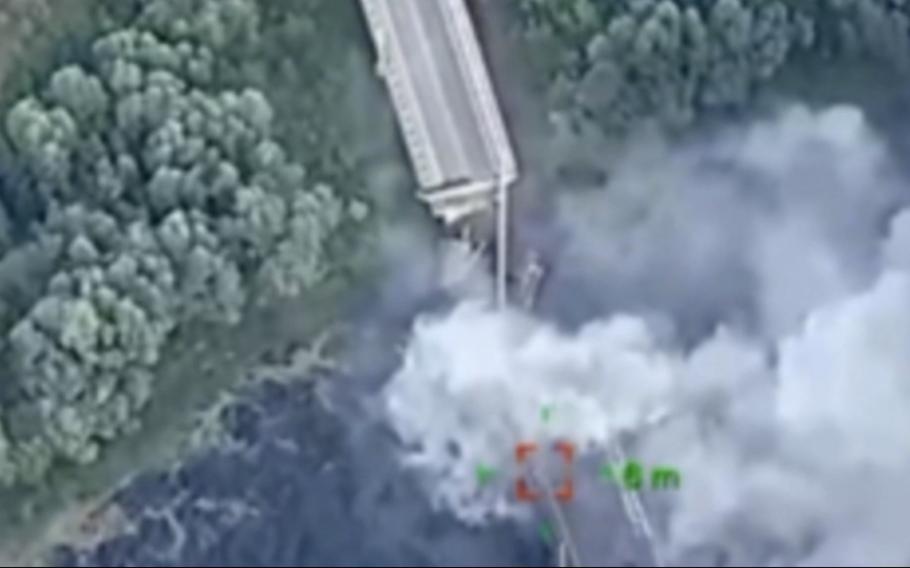
In this photo provided by the Ukrainian Defence Ministry Press Office, a strategically important bridge over the river Seym is destroyed by Ukrainian troops as they continue their incursion into the Kursk region, Russia, Friday, Aug. 16, 2024. The bridge was used by the Kremlin to supply its troops and its destruction could hamper their efforts. (Ukrainian Defence Ministry Press Office via AP)
Russia’s security service, the FSB, launched criminal cases against several foreign journalists on Thursday, accusing them of illegally entering Russia to report on the Ukrainian incursion into the Kursk region.
In a statement Thursday, the service named Nick Paton Walsh, a British citizen and CNN’s chief international security correspondent, as well as two Ukrainian reporters with independent news outlet Hromadske, Olesya Borovik and Diana Butsko.
The FSB said they would be placed on Russia’s wanted list. Under Russian law, the maximum penalty for illegally crossing the border is five years in prison.
The CNN report, showing journalists traveling with a Ukrainian military convoy from Ukraine into a nearly deserted Sudzha with a few dozen residents remaining, aired Aug. 16.
CNN described the trip as important and justifiable and part of its mission.
“Throughout this conflict our team has delivered factual, impartial reporting covering both the Ukrainian and Russian perspectives on the war,” a CNN spokesperson told The Washington Post in a statement. “Our team was invited by the Ukrainian government, along with other international journalists, and escorted by the Ukrainian military to view territory it had recently occupied. This is protected activity in accordance with the rights afforded to journalists under the Geneva Conventions and international law.”
In addition to CNN, The Post and several other news organizations have made reporting trips into Ukrainian-held territory in Kursk in recent days. The FSB statement referred only to CNN’s actions.
Earlier this week, Russia summoned U.S. Chargé d’Affaires Stephanie Holmes to protest the “provocative actions” of American media reporting from the Kursk region.
The U.S. Embassy in Moscow rejected Russian accusations, saying in a statement Wednesday that independent news organizations “make their own operational and personnel decisions.” “The U.S. government plays no role.”
The statement added that it “actively discourages” U.S. citizens from even traveling to Russia.
Last week, the FSB initiated similar cases against Italian TV network RAI journalists Simone Traini and Stefania Battistini, who published the first report from Sudzha as part of a military embed with Ukrainian forces.
RAI news agency CEO Roberto Sergio said in an earlier statement that the two reporters will return to Italy for safety reasons.
The Russian Foreign Ministry on Saturday summoned Cecilia Piccioni, Italy’s ambassador in Moscow, to protest the journalists “using their stay in the territory of our country to whitewash the propaganda support for the crimes of the Kyiv regime.”
RAI also stressed that its reporters “complied with the norms of international law” when covering the situation in Kursk Oblast.
“Journalism is not a crime,” RAI union Usigrai and Italy’s national press union FNSI said in a joint statement. “Reporting is not done with prior authorizations … Journalists worldwide have always asked for guarantees of access to conflict zones, in Ukraine as in Gaza and in every war zone, where the need to know what is happening is urgent.”
A surprise Ukrainian operation in early August caught Russian soldiers manning the border, many of whom are young conscripts, off guard, allowing Ukrainian forces to capture dozens of settlements and take hundreds of prisoners.
According to Russian authorities, more than 120,000 civilians have been evacuated from the area. The incursion is unlikely to dent Russia’s overall advantage in numbers, but it served as a major morale boost for Ukrainian troops and a potential leverage for Kyiv in any future negotiations.
President Vladimir Putin held a second meeting Thursday to address what Russian officials refer to as “the situation in Kursk.”
Governors of two border regions neighboring Kursk asked the Russian leader for additional funding to supply units of territorial defense and pay them salaries. The governor of Belgorod, which has seen continuous hostilities throughout the war, said that the region has two territorial defense regiments totaling about 6,000 men.
Russia has so far downplayed the incursion into its territory, with state media covering it as a limited and contained operation, while actively juxtaposing it with Russian advances inside Ukraine.
Independent Russian-language outlet Meduza reported that the Kremlin aims to condition the Russian public to accept the presence of Ukrainian forces on its territory as the “new normal” in case Kyiv manages to hold its positions there for weeks to come, while prioritizing the drive to control all of Donetsk region in Ukraine. Russian forces are bearing down on the logistical hub of Pokrovsk.
“The Kremlin may be using this messaging campaign to afford itself time and space to respond to the Ukrainian incursion into Kursk Oblast after achieving its offensive objectives in eastern Ukraine,” the Institute for the Study of War, a Washington-based think tank, said in recent analysis.
On Wednesday, Russian Defense Minister Andrei Belousov sent a congratulatory note to units that seized the village of Zhelanne southeast of Pokrovsk.